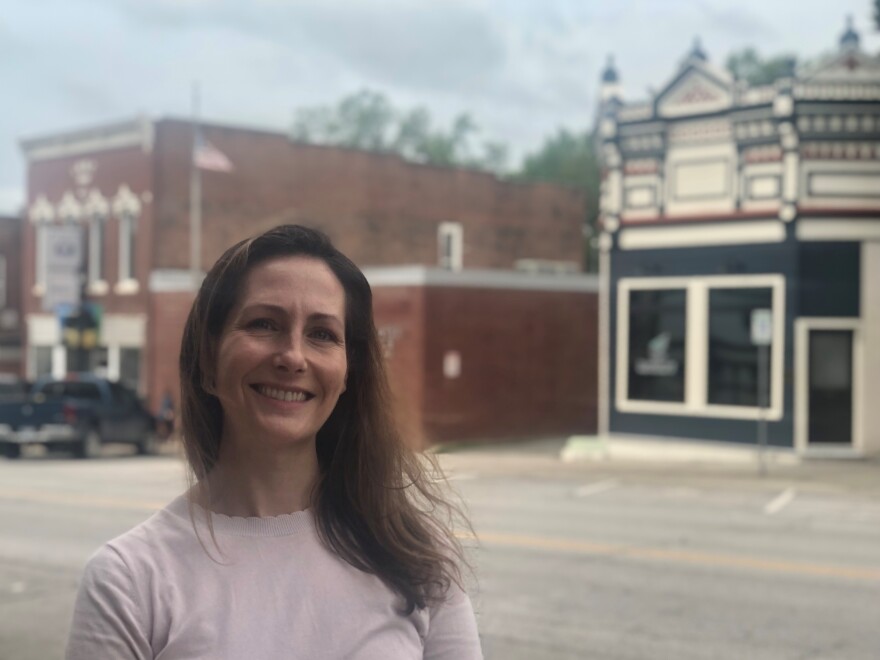For more than 100 years, Eudora had a weekly newspaper.
“We were able to have a sports reporter, somebody that would come out when we had a structure fire and report on it,” said Mayor Tim Reazin, who moved to Eudora in 1997. “We had somebody that sat through the city commission meetings with us.”
But since 2004, more than 1,800 newspapers have folded, a third of them in rural communities. Eudora residents lost their paper in 2008. Reazin says the result is citizens are less informed – and starved for coverage.
“Every once in a while we get a mention in the Lawrence Journal-World,” Reazin said. “One of my sons was a starting quarterback this year, and you know, you get this little blurb, a few sentences that say what they did. It’d be great to have those newspaper clippings you don’t get.”
That’s why city officials were so enthusiastic when a journalism professor at the University of Kansas approached them about having student reporters cover the town.
Real-world experience
It was Teri Finneman’s first year teaching at KU, and she wanted to make sure her students were graduating with the clips and hands-on practice employers want.
KU journalism professor Teri Finneman says students need real-world experience.

“I’m a really big proponent of my students having real-world experience. I do not like doing canned exercises,” Finneman said.
She said a city as large as Eudora – population 6,500 – should have someone covering it. Her students started small, sharing photo galleries on Facebook. When they immediately got likes and shares, Finneman decided her students could do more. She created a website called the Eudora Times and started assigning stories to her reporting students.
Junior Riley Wilson says writing stories for the citizens of Eudora was different from the assignments she’d done in class.
“Before this semester it was always, ‘I have to get the information, and I have to get it down in a story.’ And now I'm like, OK, well, I have that, but is it interesting?” Wilson said.
At first, Wilson and her classmates worried they wouldn’t have much credibility because they were still learning to be journalists. But she says she quickly realized that people in Eudora were just glad someone wanted to cover them.
“Every time I've done a story, people are really excited to tell me about what they're doing,” she said. “They like seeing that people do care about what's going on in small towns, especially their town.”
A ‘mighty feeling of community’
Assistant City Manager Leslie Herring has helped the journalism students navigate around town.
Riley Wilson is one of the KU journalism students who's been reporting in Eudora. She plans to return in the fall.

“About three-quarters of our population leaves during the day, but we definitely have that mighty feeling on the weekends of community,” she said, turning into the parking lot for the Eudora Schools administrative offices. “They go to church in this community. They send their kids to public schools.”
Superintendent Steve Splichal said students deserve coverage of the work they put into sports and activities like plays and musicals.
“I think it's exciting anytime you get an opportunity to showcase what the important work that's going on in the, across the school district,” Splichal said. “Families want to be able to share with extended families the things that their kids are doing in school, and it’s a great thing.”
He said he’s seen stories from the Eudora Times shared on Facebook and other social media platforms.
Good schools are one of the reasons people move to Eudora. Housing is another. Many residents work in Johnson County, but they buy houses in Eudora because it’s more affordable. So Eudora is growing – about 60 new houses have gone up in the last two years.
“The biggest thing we hear requests for is a sit-down restaurant,” Herring said. “Right now we've got a bar and grill that is more bar than grill. We’ve got a Chinese and Mexican restaurant. It's in one. But we really don't have anywhere for people to come and sit down and have breakfast or have like a Sunday dinner.”
Building trust
Finneman, who is also a journalism historian, says without newspapers, there’s no one to preserve that local history.
“It's just really interesting to see how much a newspaper can bind a community together and be like a central place for them to preserve their history, for them to know what's going on in their community, for them to have an understanding of the media works,” Finneman said. “That is a contributing factor to why we have so many anti-media attitudes today.”
She said without local journalists out and about in the community, people stop seeing members of the news media as people.
Mayor Reazin said he’s been able to see that shift as people get used to seeing the journalism students in Eudora.
“At first it was like, you know, ‘Who’s taking pictures?’ I had people ask,” Reazin said. “But it would be great for our community to have someone here on a regular basis.”
And that’s the plan. Finneman and her journalism students will return to Eudora in the fall to tell more stories.
Elle Moxley covers education for KCUR. You can reach her on Twitter @ellemoxley.



